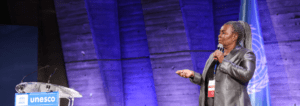
By:Eva-Rakel Johannes
The social protection for artists &cultural professionals’ in Namibia has been the focal point of public discussion at the National Art Gallery of Namibia (NAGN) in Windhoek on Tuesday.
The Ministry of Education, Arts and Culture (MoEAC) and the United Nations Educational, Scientific and Cultural Organisation (Unesco) hosted a public discussion centred on the critical topic of social protection for Namibian artists and cultural professionals.
Namibia’s creative brains, whose work frequently goes unnoticed and unsupported, was referred to as long overdue by key stakeholders.
They argued that poor working conditions, combined with a lack of social security, serve as a wake-up call to all parties.
The aim of the event was to cast a spotlight on the pressing need for inclusive social protection mechanisms within the cultural and creative sector in the country. It also seeks to foster heightened awareness, facilitate the exchange of insights, and spark a collaborative drive to integrate comprehensive social protection solutions.
MoEAC Deputy Minister Faustina Caley underscored that diverse representation is imperative in the pursuit of equal rights for the arts, crafts and entertainment sector.
“This is a sector that carries and keeps the human spirit moving and intersects with many other sectors. This is because it is founded on creativity from which many things are born, such as art, design which includes fashion, jewellery, gaming, technology, architecture, to mention but a few,” she said.
Minister Caley referenced previous initiatives by the government in 2020 and 2021 that acted as economical buffers, granted to people from various sectors amid the devastating effects of Covid-19. However, the relief package’s scope did not adequately address the unique needs of artists and cultural professionals, she said.
She further noted, “The relief package did not clearly provide how they supported the cultural and creative industries and its practitioners, which include practitioners in crafts, film, sound and light technical companies, theatres, galleries, arts and craft centres, to mention a few.”
Maya Stern, speaking as an International LabourOrganisation delegate, extended the topic when the discussions shifted to the legal implications of social protection.
Stern emphasised that “social security is more than just a policy; it is a fundamental human right. However, as we look around the world, we see disparities in how this right is realised.”
She pointed out that it is responsibility of societies to bridge this gap, to extend the shield of social security to every corner of the world.
Aligned with the Unesco 2005 Convention on the Protection and Promotion of the Diversity of Cultural Expressions, to which Namibia is a signatory, and the Unesco 1980 Recommendation concerning the Status of the Artist, the pursuit of social protection for artists and cultural professionals is firmly anchored.
The 2005 Convention underscores the importance of safeguarding artistic expression and economic rights, upholding the sovereign rights of states to champion cultural expressions within their borders.
Similarly, the 1980 Recommendation recognises the symbiotic relationship between the well-being of artists and the vitality of the arts.
The mission is to construct social protection systems that are sustainable, adaptable, and in sync with global practices and trends across kindred sectors.
The public discussion focused on an in-depth analysis of the status of artists in Namibia within the framework of the 2005 Convention, highlighted the imperative for social protection mechanisms tailored for artists and cultural professionals in Namibia and charted a clear path forward for the provision of comprehensive social protection in Namibia’s creative and cultural sector.
As the public discourse unfolded, the anticipated culmination was the formulation of actionable policy recommendations and strategies. These insights will stand as a testament to the shared commitment of stakeholders to bolster social protection for artists and cultural professionals across the country.
As Namibia gears up for this endeavour, it was stressed that all stakeholders need to know what they bring to the social table and how those contributions are to be monetised and made relevant within the industry and the greater economy.









Comments